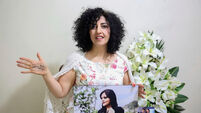Police investigate Czech hospital baby-swap case
Two new mothers sent home with each other’s baby, which they raised as their own for months, were today still waiting for an explanation from the hospital.
As police were called in to investigate the Czech clinic in Trebic, 100 miles from Prague, both sets of parents were meeting to discuss how best to return the baby girls to their rightful homes.














